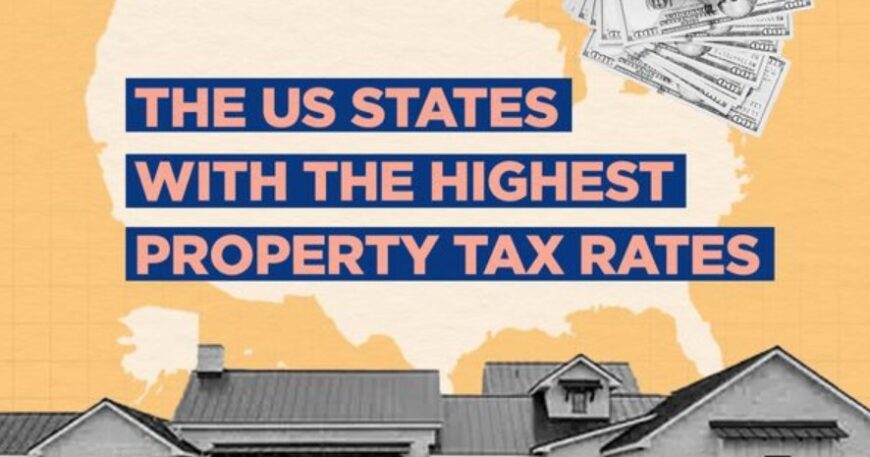Property taxes are one of the largest components of home ownership and real estate investment. Does that explain it to you? Of course not. Suppose you’re a property owner in New York City, managing personal property, or simply curious about how property taxes work across different states. In that case, this guide should help you navigate the complexities of property tax assessments and payments.
We will discuss property tax, NYC property tax, personal property tax, and even property tax by state over here. Giving you the kind of knowledge you need to make a decision that best suits you.
What are Property Taxes?
In its simplest form, property tax is a tax that the local government imposes on property owners. It is one of the most common ways by which municipalities generate revenue for schools, public services, infrastructure, and other community services. Property taxes usually depend on the value of the property you own, which can be land, residential buildings, and commercial properties.
How is Property Tax Calculated?
Generally, the calculation of property taxes involves the following steps:
Assessed Value: The local authority assesses the value of your property. Usually, annually or after several years.
Tax Rate: A tax rate is provided by the local government for application about your property’s assessed value.
Exemptions and Deductions: Depending on where you reside, there may be some exemptions or deductions available that could lower your property tax load related to issues like seniors, veterans, or homestead.
Final Tax Bill: Multiply your property assessment value by the tax rate. Subtract any exemptions or deductions to determine your final tax bill for properties.
New York City Property Taxes NYC Property Tax
New York City property tax has features that are confusing for the city’s real estate market and classification system. NYC follows a multi-class property tax system. In this system, the county divides all the properties into various classes, and every class is assigned a different tax rate.
Classifications of Property Taxes in NYC
1): One- to three-family homes, including condos and co-ops.
2): Residential rental properties, including apartment buildings.
3): Electric and gas companies
4): Industrial and commercial
New York City property taxes are confusing in part because the assessment can be quite different from the true market value of the property. In most cases. Property is assessed at some fraction of market value so the tax burden does not closely track full market value.
How New York City Computes Property Taxes
NYC property taxes are assessed as a fraction of the market value of property times the assessment ratio, which is the fraction of market value applied to taxation. Then comes the tax rate for that class of property.
The general tax rate for each class is readjusted each year and in Class 1 properties where people own homes, the effective rate is relatively low. Commercial property tax rates are normally high in Class 4.
NYC Property Tax Exemptions
New York City offers several property tax exemptions that can reduce your tax liability enormously. Some of the most common exemptions include:
STAR (School Tax Relief) Program: For the primary residents, this program offers savings on school taxes.
Veterans Exemption: Veterans with eligible service may be eligible for tax reductions.
Senior Citizens Homeowners‘ Exemption (SCHE): For low-income elderly homeowners.
Be aware that exemptions change from year to year.
What is Personal Property Tax?
Real property is the bulk of property taxes, or land and buildings. Conversely, most states and municipalities also impose personal property taxes. Personal property taxes are all movable property that does not have a fixing to the land, or, in other words, vehicles, machines, business equipment, as well as sometimes intangible property like stocks or bonds.
Personal property tax is also a very common phenomenon in business, where businesses pay tax on equipment, inventory, and other assets used in commercial activities.
Examples of Personal Property Subject to Tax
Business Equipment: computers, machinery, and office supplies used in operations
Vehicles: cars, trucks, boats, etc.
Inventory: goods held for sale in a business, such as retail merchandise or raw materials.
Although personal property tax is primarily applied to businesses, it can also affect individual property owners. Various local governments can also have different taxation for the personal property owned by persons in that jurisdiction including their recreation vehicle or boat.
Calculations for Personal Property Tax
Personal property tax is a method that is very close to the real property tax method where the value of the personal property is assessed and multiplied by a given tax rate. The personal property tax rate has wide variations by state, as well as even among municipalities.
Some states collect personal property taxes every year, and others collect at certain periodic intervals or even under special conditions.
Property Tax by State: A Quick Peek at the Difference
A state-by-state analysis presents the most contrasting differences as far as the laws covering property tax go. These include rules and regulations followed in assessment, rates taxed, and all the respective exemptions. Take a brief look at the importance of such states in the United States and the difference seen in California.
The rate for property tax in California depends on the purchase price and is limited to not exceed 1% of the assessed value of a given property; additional local taxes may apply. Proposition 13 does not allow an annual increase in an assessment value except for a change of ownership and that should not be more than 2%.
Texas
Texas is one of the states that have abolished the imposition of state-level property tax. Property taxes are instead collected by local governments. Property taxes in Texas are some of the highest in the United States, but there is no state income tax to balance it out with the heavier burden of property taxes.
Florida
Property has relatively low taxes in Florida compared to national averages, with an average percentage of about 0.83%. However, on the other hand, it still provides different exemptions, with the Homestead being part of them, concerning reducing the property tax value.
New Jersey
New Jersey is always high in the country for its property taxes, with an average rate of about 2.42% of assessed value. Uses property taxes to finance schools, municipal services, and local governments.
Illinois’s effective average property tax rate is approximately 2.1%. Illinois adjusts the assessed value of property using a statewide equalization factor to ensure fairness.
Key Takeaways: Navigating Property Taxes
Understanding property taxes is completely essential to every property owner in New York.
City to California. Since tax laws are often different and rates are generally different among states, stay updated on the possible locality or state-level benefits.
NYC Property Tax: NYC employs a multi-class system in assessing property taxes. You will need to know what class your property is to understand your tax rate.
Personal Property Tax: Any business or individual with movable property may be subject to personal property taxes, which can vary greatly by jurisdiction.
State Differences: Property tax rates and laws differ significantly from state to state. Make sure to look up your local tax laws and take advantage of any exemptions available.
If you do not understand or feel you cannot control your property tax situation, you should always consult with a tax professional or real estate expert. Whether you’re trying to reduce taxes, understand exemptions, or just need clarity on assessments, an expert can guide you through the property tax systems‘ complexities.
Syed Professional Services: Your Solution to Property Taxes
Syed Professional Services specializes in guiding property owners through the maze of property taxes, be it residential, commercial, or personal. Our professionals are well-experienced and provide you with personalized services that cater to your specific needs, so you are well aware of your tax obligations and minimize your tax liabilities.
If you are having a problem with property taxes in NYC or elsewhere, please don‘t hesitate to call us. We can help step by step from property tax assessment to exemption so you pay only what you owe.




